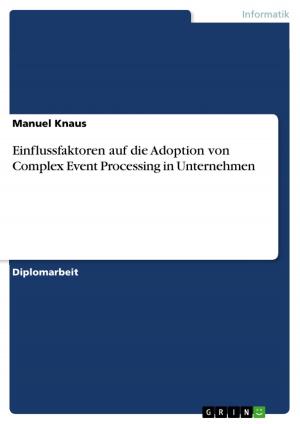Interpretation of Beethoven's Fidelio or Leonore and four different overtures
Nonfiction, Social & Cultural Studies, Social Science, Cultural Studies, Popular Culture| Author: | Myunghwa Jang | ISBN: | 9783640773695 |
| Publisher: | GRIN Verlag | Publication: | December 9, 2010 |
| Imprint: | GRIN Verlag | Language: | English |
| Author: | Myunghwa Jang |
| ISBN: | 9783640773695 |
| Publisher: | GRIN Verlag |
| Publication: | December 9, 2010 |
| Imprint: | GRIN Verlag |
| Language: | English |
Research Paper (undergraduate) from the year 2010 in the subject Sociology - Media, Art, Music, The University of Malaya, language: English, abstract: Written with librettist, Joseph von Sonnleithner, Beethoven's first version was divided into three acts in the style of a German Singspiel. In a singspiel, a fresh start has to be made after every spoken interruption. Fidelio was first performed on November 20, 1805 after being delayed due to issues with the censors. The opera opened to a small audience and negative reviews. A year later Beethoven attempted a revision of Fidelio for the same theatre. Due to a change in management Beethoven was presented with a new librettist by the name of Stephan von Breuning. After a great deal of struggle, a very reluctant Beethoven agreed to a much more condensed and concise version of the opera. The newly revised version was performed on May 29, 1806. Again the audience was not Beethoven's ideal audience and the show failed once again. After reading a refined libretto by Georg Friedrich Treitschke, Beethoven agreed the revival but insisted on a complete revision in which he virtually started over. Nearly every number was altered in some fashion. The third and final version of the opera opened with great success on May 23, 1814. It took Beethoven over a decade to complete his only opera. Throughout the many revisions he produced four different overtures. The first, now known as Leonore #2 was written for the opera's premiere in 1805. Because some sections proved to be too difficult Beethoven began reworking the overture for the opera's revival in 1806. The new version became known as Leonore #3. Beethoven's final revision composed for the 1814. Production was called the Fidelio Overture. After his death a fourth overture was found. Entitled Leonore #1 it is believed he either wrote it first or for a production of Fidelio in Prague that never happened. Leonore #3 is often played between the two scenes in Act 2. However, many critics such as Henry W. Simon consider this practice to be 'abhorrently inartistic' due to the dramatic nature of the piece.
Research Paper (undergraduate) from the year 2010 in the subject Sociology - Media, Art, Music, The University of Malaya, language: English, abstract: Written with librettist, Joseph von Sonnleithner, Beethoven's first version was divided into three acts in the style of a German Singspiel. In a singspiel, a fresh start has to be made after every spoken interruption. Fidelio was first performed on November 20, 1805 after being delayed due to issues with the censors. The opera opened to a small audience and negative reviews. A year later Beethoven attempted a revision of Fidelio for the same theatre. Due to a change in management Beethoven was presented with a new librettist by the name of Stephan von Breuning. After a great deal of struggle, a very reluctant Beethoven agreed to a much more condensed and concise version of the opera. The newly revised version was performed on May 29, 1806. Again the audience was not Beethoven's ideal audience and the show failed once again. After reading a refined libretto by Georg Friedrich Treitschke, Beethoven agreed the revival but insisted on a complete revision in which he virtually started over. Nearly every number was altered in some fashion. The third and final version of the opera opened with great success on May 23, 1814. It took Beethoven over a decade to complete his only opera. Throughout the many revisions he produced four different overtures. The first, now known as Leonore #2 was written for the opera's premiere in 1805. Because some sections proved to be too difficult Beethoven began reworking the overture for the opera's revival in 1806. The new version became known as Leonore #3. Beethoven's final revision composed for the 1814. Production was called the Fidelio Overture. After his death a fourth overture was found. Entitled Leonore #1 it is believed he either wrote it first or for a production of Fidelio in Prague that never happened. Leonore #3 is often played between the two scenes in Act 2. However, many critics such as Henry W. Simon consider this practice to be 'abhorrently inartistic' due to the dramatic nature of the piece.















